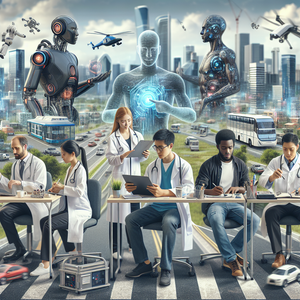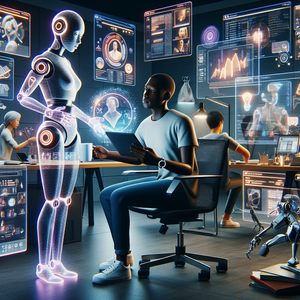
Navigating Career Security in an Automated World: Exploring AI-Resilient Professions
In an era where artificial intelligence (AI) and automation are rapidly transforming the employment landscape, many are understandably anxious about their professional futures. The conversation often revolves around which jobs may be rendered obsolete and which will endure. This article aims to highlight professions deemed "AI-proof," focusing on those that leverage distinctly human attributes like emotional intelligence, creativity, and advanced problem-solving abilities. Sectors such as healthcare, education, and skilled trades stand out as resilient career paths, with various roles projected to see significant growth by 2032. We will examine these positions, supported by key statistics and real-world examples, providing a vital resource for individuals looking to secure their careers amidst increasing automation.
Job Summaries:
Nurse Practitioner:
- Nurse practitioners (NPs) are indispensable healthcare providers who perform a range of essential functions, from diagnosing illnesses to prescribing treatments.
- With a master's degree in nursing and national certification, these professionals are integral to patient education and preventive care.
- The demand for NPs is expected to surge by over 45% by 2032, underscoring the irreplaceable human connection in healthcare that automation cannot replicate.
Mental Health Counselor:
- The role of mental health counselors is critical as they offer support to individuals facing emotional and psychological challenges.
- Through personalized assessments and treatment plans, they engage in therapeutic conversations that require deep empathy.
- Typically, a master’s degree in counseling or psychology is necessary.
- As awareness around mental health grows, the profession is set to thrive, with machines unable to mimic the nuanced human interactions required for effective counseling.
Vocational Education Teacher:
- Vocational education teachers equip students with essential skills in various trades.
- Preparing students for hands-on careers in sectors like healthcare and technology.
- Educators design curricula that adapt to market needs, ensuring students are job-ready.
- Requiring at least a bachelor's degree.
- The demand for vocational training is projected to rise significantly.
- Affirming the importance of human insight in education.
Creative Artist:
- Creative artists rely on their unique visions and emotional depth to produce original works.
- Musicians and visual creators are included in the category of creative artists.
- A strong portfolio is vital for success in this field.
- Formal education in fine arts can expand opportunities for creative artists.
- Creativity is an inherently human trait.
- This profession is largely insulated from automation.
- There is a steady demand for innovative cultural expressions that resonate with audiences.
Skilled Tradesperson:
- Skilled tradespeople, such as electricians and plumbers, engage in hands-on work that requires adaptability and specialized skills.
- These roles involve problem-solving in diverse environments, making them less susceptible to automation.
- Typically requiring a high school diploma and relevant apprenticeships, skilled trades are increasingly valued for their stability and the ongoing need for maintenance in our aging infrastructure.
Physical Therapist:
- Physical therapists guide patients in recovery and rehabilitation through customized treatment plans.
- This field necessitates a doctoral degree in physical therapy and appropriate licensure.
- The personal interaction and adaptability integral to therapy highlight the irreplaceable role of human care.
- Projected growth rate of 27.6% by 2032 ensures a solid future for practitioners.
Human Resources Specialist:
- Human resources specialists are vital in managing recruitment, employee relations, and organizational culture.
- Their work requires strong interpersonal skills and the ability to navigate complex human dynamics.
- A bachelor’s degree in human resources or a related field is typically needed.
- As workplaces evolve, HR specialists will remain essential in fostering positive work environments—tasks that AI cannot fully replicate.
Social Worker:
- Social workers assist individuals and families facing challenges such as poverty and mental health issues.
- They create intervention plans and link clients with community resources.
- This role requires a degree in social work and state licensure.
- Empathetic understanding of human behavior is necessary for this role.
- Social work is a robust career choice, especially as demand for these services continues to rise.
Educator:
- Educators play a critical role in shaping the minds of students across various grade levels and subjects.
- They focus not only on academic achievement but also on social and emotional development.
- With a bachelor’s degree in education and state certification, teachers adapt their methods to meet diverse learning needs.
- Ensuring their role remains vital in an automated world where building trust and motivation is key.
Healthcare Support Roles:
- Positions like medical assistants and home health aides are essential in providing direct support in patient care.
- These roles involve crucial human interactions and personal attention that automation cannot replace.
- Training programs and certifications often prepare individuals for these fulfilling careers.
- These roles are increasingly recognized for their importance in the healthcare system.
As the workforce continues to evolve with technological advancements, choosing a career path that emphasizes human strengths is vital. By understanding the unique attributes that make certain professions resilient to automation, individuals can make informed decisions about their future. Embracing continual learning and adaptability will be key in navigating the job landscape, ensuring that the human touch remains an essential element in the workplace.
Explore More Jobs

